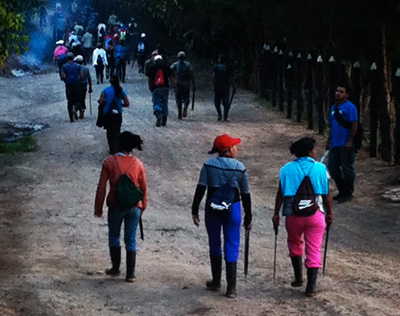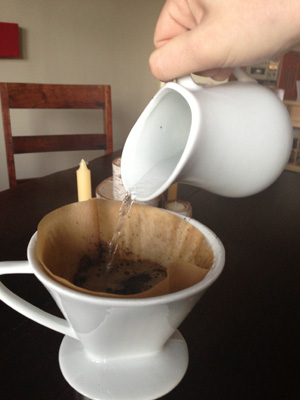 A coffee farmer shared with me that the most injury prone job picking coffee involves climbing. When one hand is holding the tree and the other a machete--what are you left with to swat the bugs?
A coffee farmer shared with me that the most injury prone job picking coffee involves climbing. When one hand is holding the tree and the other a machete--what are you left with to swat the bugs?
Last March I traveled to a coffee plantation in Nicaragua to help run a volunteer medical and dental clinic for the workers, their families, and the villagers. The team set up shop in an open-air church and saw 1,200 patients in a week. Babies with distended bellies from parasites, respiratory infections, decayed teeth, dehydration. Patients lined up. Machete wounds were common. One involved a bee.
I was overwhelmed by the emotion of it--watching some brave person getting teeth pulled, barely betraying their pain. I would walk out to the rainforest and indulge in a good cry. I expected the week to be hard--what surprised me was the joy. Despite the intense emotions, I also laughed harder that week than I could remember doing for a long time. (Sometimes because the very earnest nurses were so bad at Spanish. Also there was a broken toilet seat incident.) It's no secret. Volunteering feeds the soul.
 Every morning the roosters would crow before dawn and I would crawl out of my sleeping bag and watch the workers gather with their machetes and picking cans to hike up the mountain. I spoke with them in my broken Spanish about their jobs, their children, and their lives. At night, the village would emerge to listen to music on the patio and watch and mingle with the unusual dancing Americans.
Every morning the roosters would crow before dawn and I would crawl out of my sleeping bag and watch the workers gather with their machetes and picking cans to hike up the mountain. I spoke with them in my broken Spanish about their jobs, their children, and their lives. At night, the village would emerge to listen to music on the patio and watch and mingle with the unusual dancing Americans.
Nicaragua changed me in ways big and small that I'm still unpeeling. A modest consequence--I drink different coffee now. Flavored coffee with half and half used to be my go-to, without much thought to when the beans were ground or how it was brewed.
After Nicaragua, I journeyed through my hometown of Chicago, exploring coffee shops. I talked to coffee people. I took it black. When you brew good coffee well--it tastes good, and you want to taste it.
 Lately, I buy beans at Asado, a small bright blue space on Irving Park. If you're inquisitive, the owner, Kevin, invites you behind the counter and shows you how he roasts beans in small batches and where they were sourced.
Lately, I buy beans at Asado, a small bright blue space on Irving Park. If you're inquisitive, the owner, Kevin, invites you behind the counter and shows you how he roasts beans in small batches and where they were sourced.
My favorite are the "Tanzania Meru Bourbon" beans, which are direct-trade and "grown high in the soils of Mt. Meru."
I've started to play with brewing by pour-over. Is it better? I think so. Mostly, it feels good. I enjoy the process and it feels intentional. Like paying proper homage to the work it took to get the coffee to my cup.
The non-profit organization that I traveled to Nicaragua with is called MEDICO. Learn more about them at www.medico.org. I look forward to traveling with them again this March.
Jessica Dixon manages a physician practice in Chicago. In her spare time she pursues aged goudas and adventures.